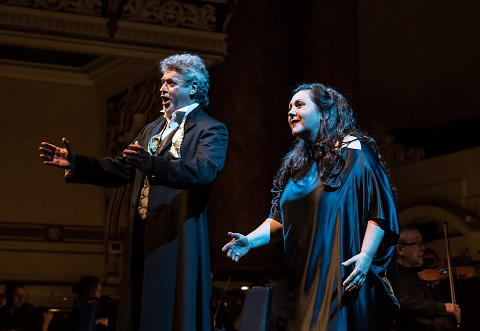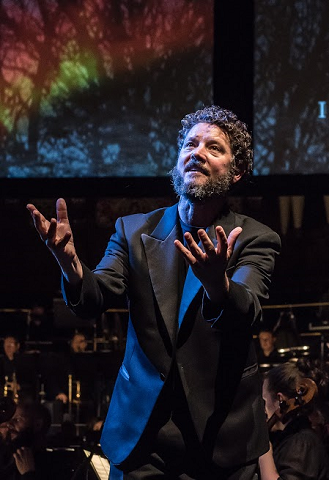Recently in Reviews
English Touring Opera are delighted to announce a season of lyric monodramas to tour nationally from October to December. The season features music for solo singer and piano by Argento, Britten, Tippett and Shostakovich with a bold and inventive approach to making opera during social distancing.
This tenth of ten Live from London concerts was in fact a recorded live performance from California. It was no less enjoyable for that, and it was also uplifting to learn that this wasn’t in fact the ‘last’ LfL event that we will be able to enjoy, courtesy of VOCES8 and their fellow vocal ensembles (more below …).
Ever since Wigmore Hall announced their superb series of autumn concerts, all streamed live and available free of charge, I’d been looking forward to this song recital by Ian Bostridge and Imogen Cooper.
The Sixteen continues its exploration of Henry Purcell’s Welcome Songs for Charles II. As with Robert King’s pioneering Purcell series begun over thirty years ago for Hyperion, Harry Christophers is recording two Welcome Songs per disc.
Although Stile Antico’s programme article for their Live from London recital introduced their selection from the many treasures of the English Renaissance in the context of the theological debates and upheavals of the Tudor and Elizabethan years, their performance was more evocative of private chamber music than of public liturgy.
In February this year, Albanian soprano Ermonela Jaho made a highly lauded debut recital at Wigmore Hall - a concert which both celebrated Opera Rara’s 50th anniversary and honoured the career of the Italian soprano Rosina Storchio (1872-1945), the star of verismo who created the title roles in Leoncavallo’s La bohème and Zazà, Mascagni’s Lodoletta and Puccini’s Madama Butterfly.
Evidently, face masks don’t stifle appreciative “Bravo!”s. And, reducing audience numbers doesn’t lower the volume of such acclamations. For, the audience at Wigmore Hall gave soprano Elizabeth Llewellyn and pianist Simon Lepper a greatly deserved warm reception and hearty response following this lunchtime recital of late-Romantic song.
Collapsology. Or, perhaps we should use the French word ‘Collapsologie’ because this is a transdisciplinary idea pretty much advocated by a series of French theorists - and apparently, mostly French theorists. It in essence focuses on the imminent collapse of modern society and all its layers - a series of escalating crises on a global scale: environmental, economic, geopolitical, governmental; the list is extensive.
For this week’s Live from London vocal recital we moved from the home of VOCES8, St Anne and St Agnes in the City of London, to Kings Place, where The Sixteen - who have been associate artists at the venue for some time - presented a programme of music and words bound together by the theme of ‘reflection’.
'Such is your divine Disposation that both you excellently understand, and royally entertaine the Exercise of Musicke.’
Amongst an avalanche of new Mahler recordings appearing at the moment (Das Lied von der Erde seems to be the most favoured, with three) this 1991 Mahler Second from the 2nd Kassel MahlerFest is one of the more interesting releases.
‘And there was war in heaven: Michael and his angels fought against the dragon; and the dragon fought and his angels, And prevailed not; neither was their place found any more in heaven … that old serpent … Satan, which deceiveth the whole world: he was cast out into the earth, and his angels were cast out with him.’
If there is one myth, it seems believed by some people today, that probably needs shattering it is that post-war recordings or performances of Wagner operas were always of exceptional quality. This 1949 Hamburg Tristan und Isolde is one of those recordings - though quite who is to blame for its many problems takes quite some unearthing.
There was never any doubt that the fifth of the twelve Met Stars Live in Concert broadcasts was going to be a palpably intense and vivid event, as well as a musically stunning and theatrically enervating experience.
‘Love’ was the theme for this Live from London performance by Apollo5. Given the complexity and diversity of that human emotion, and Apollo5’s reputation for versatility and diverse repertoire, ranging from Renaissance choral music to jazz, from contemporary classical works to popular song, it was no surprise that their programme spanned 500 years and several musical styles.
The Academy of St Martin in the Fields have titled their autumn series of eight concerts - which are taking place at 5pm and 7.30pm on two Saturdays each month at their home venue in Trafalgar Square, and being filmed for streaming the following Thursday - ‘re:connect’.
The London Symphony Orchestra opened their Autumn 2020 season with a homage to Oliver Knussen, who died at the age of 66 in July 2018. The programme traced a national musical lineage through the twentieth century, from Britten to Knussen, on to Mark-Anthony Turnage, and entwining the LSO and Rattle too.
With the Live from London digital vocal festival entering the second half of the series, the festival’s host, VOCES8, returned to their home at St Annes and St Agnes in the City of London to present a sequence of ‘Choral Dances’ - vocal music inspired by dance, embracing diverse genres from the Renaissance madrigal to swing jazz.
Just a few unison string wriggles from the opening of Mozart’s overture to Le nozze di Figaro are enough to make any opera-lover perch on the edge of their seat, in excited anticipation of the drama in music to come, so there could be no other curtain-raiser for this Gala Concert at the Royal Opera House, the latest instalment from ‘their House’ to ‘our houses’.
"Before the ending of the day, creator of all things, we pray that, with your accustomed mercy, you may watch over us."
Reviews

05 Jul 2016
Siegfried, Opera North
This, alas, was where I had to sign off. A weekend conference on Parsifal (including, on the Saturday, a showing of Hans-Jürgen Syberberg’s Parsifal film) mean that I missed Götterdämmerung, skipping straight to the sequel.
Perhaps I shall find out some day how it all turned out. Very well, I should expect, at least performatively. For, if I did not find that this Siegfried quite attained the heights of the Walküre two nights previously, Opera North’s remained an achievement that put a good number
of larger companies to shame.
It helped, of course (to put it mildly!) to have Richard Farnes continue his excellent work, not in the pit, but at the podium. As with the Walküre, I found some of the first act a little on the subdued side, the music only really igniting during the final scene, and only truly blazing
with the extraordinary Second Act Prelude, in which the Orchestra of Opera North once again showed that it had nothing to fear from the most exalted of
comparisons. Perhaps that is Farnes’s way, wanting to leave something in reserve. However, in this particular drama, especially when seen and heard without
a full staging, something more immediately arresting would not have been a bad thing. I also felt that the intensity of the third act might have been more
consistently maintained. It was certainly not a case of failing to understand, or indeed to communicate, its contours. However, between the Prelude to the
Third Act - the Prelude to the Ring’s very peripeteia - and a shiver-inducing final duet, there was, at least for my taste, perhaps a little too
much placidity. That said, Farnes’s conducting and the orchestral playing will, I am sure, long be spoken of warmly, both in London and in the earlier
venues of the Opera North tour.
 Richard Roberts as Mime. Photo Credit: Clive Barda.
Richard Roberts as Mime. Photo Credit: Clive Barda.
Béla Perencz’s Wanderer sounded suitably resigned, without that implying any lack of attention to the particularities of words and music. If I have heard
more imposing portrayals, there was a humanity here that most would have warmed to - and I did. Jo Pohlheim’s Alberich was a definite strength of the Rheingold three nights earlier, and so again it was here. Less pitch-black than some, this was a dwarf who very much retained character of his
own. So too did Richard Roberts’s Mime, especially noteworthy for fine acting within the constraints (or should that be liberation?) of a ‘concert
staging’. Mats Almgren proved a properly stentorian Fafner. Lars Cleveman offered laudable staying power in the title role, at least until the earlier
stages of the final scene. (It is quite understandable that he should have been tiring then!) However, his voice was decidedly less than ingratiating;
such, alas, is the way with almost all Siegfrieds. It was nevertheless a committed performance, and that is worth a good deal. Ceri Williams’s Erda was
again somewhat insecure. However, the other two ‘female’ roles were superbly taken, Jeni Bern a veritable breath of fresh air as a lively Woodbird, and
Kelly Cae Hogan fully living up to the promise of her Walküre Brünnhilde in a blazing performance at the close. Again, if only I knew how it all
turned out …
If only the nuances of verbal meaning had not too often been ironed out in translation. (Sometimes, it was spot on; at other times, overly generalised.
Surely Wagner’s poems deserve near-literal translation in such circumstances, for this was not a singing translation. Fafner’s Proudhonian ‘Ich lieg’ und
besitz’ loses far too much, indeed almost everything, as ‘What’s mine is mine’. Possession, one might say, is if not nine tenths, then at least half, of
the rentier meaning. But such niggles, and ongoing concern-cum-irritation over increasingly screensaverish projections, remained just that,
niggles, in the face of Opera North’s magnificent achievement. More Wagner soon, please!
Mark Berry
Richard Wagner, Siegfried
Siegfried: Lars Cleveman; Mime: Richard Roberts; The Wanderer: Béla Perencz; Alberich: Jo Pohlheim; Fafner: Mats Almgren; Erda: Ceri Williams; Brünnhilde:
Kelly Cae Hogan; The Woodbird: Jeni Bern. Concert Staging, Design Concept, Lighting, Projection: Peter Mumford; Associate Director: Joe Austin. Orchestra
of Opera North/Richard Farnes. Royal Festival Hall, London, Friday 1 July, 2016.

